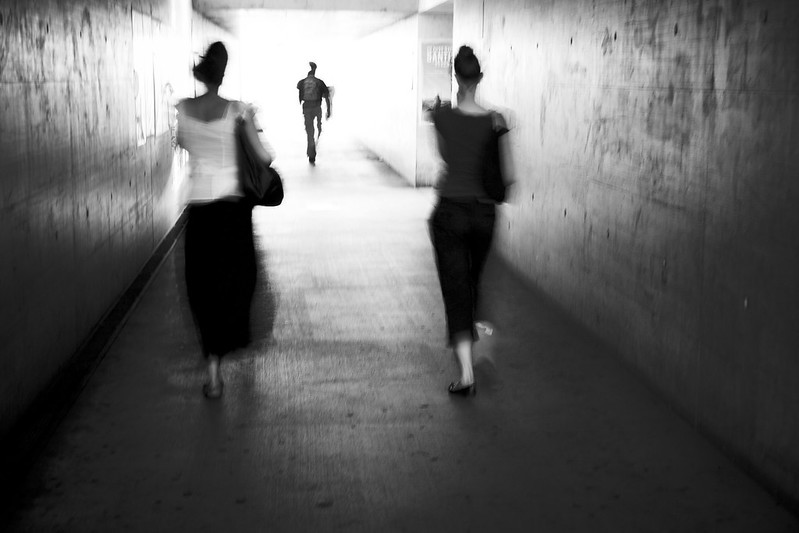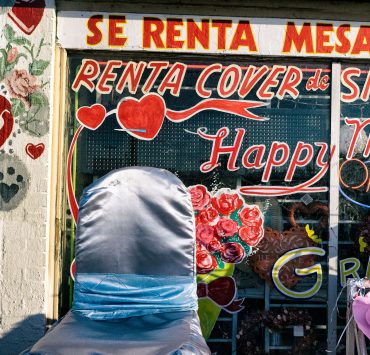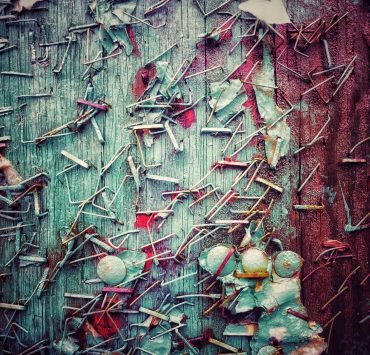
Months before, Eusebia sat next to an older Dominican woman who talked to the roof of the moving bus they were on, who lamented she had to move to Reading, PA with her cousin because she couldn’t afford her rent anymore. At one point, she looked directly at Eusebia. Have you heard of Reading, PA? Eusebia shook her head. What should I do? I don’t want to leave my home, the old woman said. Eusebia held the strange woman’s hand, silently patting it. That day, she’d been sure it would never happen to her. Why had she thought they were immune?
Today, Eusebia pushed the laundry cart out of her building. It was so heavy she had to use the strength of her entire body as she got it out of the building, through to the sidewalk. The noise from the construction started at exactly 7am, as she crossed the street into Nothar Park. It was deafening. There was hammering and yelling, and huge machines put in place just to amplify all the noise. Maybe it wouldn’t be so bad. Maybe this construction wouldn’t yield displacement. But what else could they be building but luxury apartments? Fancy, expensive and meant for people who didn’t look like any of them.
How would she fix this mess?
At the thought, she felt her body hurled into the air. The cart fell over and she fell to the side of it. Both hands went out instinctively to break her fall, one touched the trunk of the tree on the way down, the other awkwardly slipped on the dirt. A loud thud. Then a stinging pain. Her head had hit the ground. Hard. Then, the weight of the cart, which inexplicably fell over on top of her, all that weight on her head. A gash opened on the back of her head somewhere. Eyes closed, she felt a torrent of blood down her neck, rivulets on her skin soaking her shirt, scarf, and coat. Eyes opened, the blood spread not down like it was supposed to but out, right around her, dispersing into the air. As if the air was made of water. Back when she still had a period, this was the full expression on the third day of her flow: out of her body the brightest of reds spreading in the bowl of the toilet – unstoppable eggs, uselessly escaping her body – a reminder the beginning of life and death often inked the same. This red in the air was just as vibrant, just as gorgeous, the same exact tone infusing the brown of the dry earth, penetrating the root of that offensive tree. Becoming the deepest red she’d seen. The hand that touched the trunk now touched the root; mesmerized, she watched as that hand turned red, then the arm attached to the hand, then her entire body, completely red! Then the park. Then the buildings. Then the sky. How had she never noticed the sky itself was an inverted bowl?
Her friends, the Tongues, appeared above her. All of them tainted red, too.
“Should we call an ambulance?” one of them asked, but their voices sounded far away.
She shook her head. She felt for the cut on her head, felt for the wound, and tentatively, on finding it, put a fingertip inside the wetness. She had to pull away fast, because from the one hand that still touched the root of that tree and the fingertip inside the wound there was no difference in texture. Inside the gash, inside her skull, unmistakably, tree bark.
“She don’t look too good,” the women said to each other. “We should call an ambulance.”
Calm yourself down, she commanded to herself silently. She blinked hard, to right the world. She tried it again. No change, all still red. Blinked harder still. Stop it, she told herself, feeling the rising panic as the world deepened to the heart of a beetroot. No need to make a big fuss. At the third hard blink, the world went back to normal. Finally, all that red gone. The world back in order. Fingertips went on the side of her head again and felt for – but did not find – a wound. There was not even a cut. Just a tender spot there.
“Let’s go to your house,” Eusebia said to the women. Her voice thicker, deeper to her own ears. Could they hear the difference?
She stood up and wiped away the dirt from her bruised hand, wiped more dirt from the side of her hip. She offered the women a small smile so they would know she was fine. She touched the side of her head again, the part that pulsed, with cautious fingertips, pressing it to make sure. She was relieved – and confused – when she still found no blood.
She took a step. She stumbled. Two of the women reached for her, then held her by each arm, while the third righted, then pushed the laundry cart, bending to pick and put back all the clothing that fell out. Humiliating, of course. Among the dirty clothes, Luz’s undergarments. Now they all knew her daughter didn’t wash her underwear by hand.
Halfway through the park, the women noticed a large moving truck parked in front of the building. An English sign on the side of the truck said “Better Move” in red bold letters, and there were lines that made those letters seem as though the truck was already in motion, hightailing it out of Nothar Park faster than a Dominican lotto winner heading back home. The back doors of the truck were open. A few men came out of the front of the truck. One cradled bright blue blankets and several brand new 3-packs of tape. The other pushed a gurney, and went straight to the front of their building, pressing buttons to be let in.
“Luz got fired yesterday?” one of the women said, her tone a question, but also not.
Eusebia didn’t respond. Her daughter fired? It made no sense and it made complete sense. Fired over what?
They didn’t push. But all three stared at her, waiting.
How did they find out?
She shook her head at them. It could have meant no, she didn’t get fired. It could have meant, in the motherly resignation all of them knew so well, that kids ultimately were put on earth to shame, to disappoint. But then Eusebia firmed her mouth to a line. The shake of her head said leave it alone.
It had gotten colder. Without gloves, Eusebia felt the cold accumulate around her nail beds, making her fingertips stiff. The bruise from the fall on her palm became a slight, throbbing pink.
As they crossed the street, a different set of men made their way out of the building with a brilliant white couch, still covered in its plastic sofa cover, a true tell of who was moving out. Veronica Garcia had such a desire to present herself as having upscale taste. Meanwhile, she’d put a plastic cover on her sofa just like they all did.
She’d been wrong that morning, while making breakfast, when she imagined Veronica doing the same thing she’d been doing. While Eusebia prepared breakfast for her family, Veronica had been preparing hers to depart. Eusebia’s hip pinched, pulled, made the opposite knee give. Her shirt felt wet with invisible blood.
“Angelica heard the boss tell her it was going to happen yesterday,” one of the Tongues said to the white couch.
The Tongues were always right. The only source of news she’d never questioned. But where had Angelica been to overhear? At the new restaurant where she worked? Maybe when everyone left work early to get wine?
But then why had Luz gotten dressed for work that morning? If she’d gotten fired yesterday?
“Veronica’s moving,” one of the women said, letting her silence win.
“Remember when,” another responded.
This was them being kind.
Eusebia remembered when. She wished the women would stop talking for a bit.
The Tongues sucked their teeth.
“Veronica is the queen of the crickets,” the women went on to distract, to make light.
It worked because it was true. Veronica, a member of a long tradition of women referred to as crickets in DR. Why would others call them sirens? These women, who would drop their panties for the men – engaged, married – these women didn’t care. These women were named crickets because it was their bodies that created so much noise, so much distraction. And just like their insect namesake, with its strong hindlegs, once they caught what they wanted, they consumed, devoured. Years ago, The Tongues saw Veronica put a hand on Eusebia’s husband Vladimir’s shoulder, and that hand stayed there longer than was necessary. Such a simple gesture, such a clear invitation. It was him, HIM, who took a step away, out of her reach.
“Good riddance, cricket,” one of the women said to the couch.
At the entrance of the building, the women were greeted by more cold, as the drilling from across the way grew ever more insistent. The jackhammer cut the concrete foundation beneath the houses. The sound was familiar – a dentist drilling into bone.
The entire building without heat made the dust weigh more, a sting to the eye that forced repeated blinks. To the right, a pile of letter sized manila colored envelopes on top of the useless radiator that hadn’t been there moments ago, when they all left the building. One of the women reached for Eusebia’s, the first on the pile, and handed it over. From the landlord. The Tongues’ envelope was at the very bottom of the pile.
The letter was in Spanish. Had the landlord ever bothered translating a single document for them before? Of course not.
The three women lifted their eyeglass chains and put their readers on.
The building was turning all the apartments into condos. Each resident would be offered a generous buy-out of the lease. Or, sure, they could buy the apartments. Either way, their days as renters were numbered. The noise across the park quieted; they didn’t know when the machines had been turned off. Each of the three women turned to Eusebia. The question hung between them delicate as a single string from a spider to the wall.
How to fix this mess?
Inside The Tongues’ apartment, it was warmer than the lobby. They didn’t take off their coats. They wheeled the cart and left it off to the side, out their door. Their apartment was exactly like Eusebia’s, facing out toward the park. The Tongues’ home had too much furniture. A couch and a loveseat and a single chair set of imitation French Louis XV tufted velvet in an olive green. There were too many cushions for a person to sit comfortably but Eusebia tried.
One sister rushed to the bathroom and got a wet cloth, wiped away the dirt from Eusebia’s forehead. Then tended to her bruised hand. The water was so hot it steamed.
“Can you check the back of my head,” Eusebia said, sounding childish to her own ears. “It feels like there’s a cut there.”
One of the women parted her long hair, searched and found nothing suspicious except a big tender bump. The throbbing on her palm half way up her forearm now, like the spider, climbing.
“We should take you to the hospital just to make sure,” the women said, then waited.
All four of them were equally suspicious of doctors.
“I’m fine,” Eusebia said.
Relieved, one of the women was already on the way to the kitchen to make coffee. Another turned the television on.
Moments later, coffee in hand, all the women stared at the killer whale with the baby on its back. Right off the coast of the Dominican Republic’s Samaná, the orca had been circling for weeks, carrying a dead baby she couldn’t let go of. The camera closed in on her, in the background, a scientist’s words, dubbed in Spanish. Should we assume all species of whales are tormented by grief?
“What are we going to do?” one of them finally said to the ceiling.
The throbbing in Eusebia’s hand had by then taken over her entire arm. She felt a slight numbness spreading to meet that side of her head, where she still felt the trickling of blood. She reached up, touched it, was surprised to find it still dry.
On the television, the whale’s baby slipped off her head, and instead of dipping low into the water as she’d been doing whenever that happened, she let the baby go. Instinctively, Eusebia stood up. She placed a hand to her heart.
“She’ll go get him,” one of the women said. All of them stared at the television as the whale swam on.
They sat in silence for a very long time, the question the women asked pulsing in the air. Eusebia could taste salt in the air, could smell it as if she’d been standing at the foot of that mountain where she’d grown up, where it gave way to a beach. What were they going to do?
Then, as Eusebia stood waiting for the whale to dive into the water, the television’s image changed. Breaking news. The image of a young naked boy, no older than Luz’s age when they’d first arrived in this country, flashed onto the screen. He’d been shot numerous times, the reporter said, and the alleged assailant carved a message unto his back: Go Home. He was in the hospital, in critical condition. The boy’s name, Jose Garcia, flashed on the screen.
Eusebia sat down. She felt light headed. There wasn’t much more of this day she could take. On the screen, the whale was back. Where had the calf gone? Where would the current take him? And this young boy, shot so many times? Who would do such a terrible thing?
The three women spoke to each other and to her, but she could no longer listen. From very far away she heard them say 1992 over and over again. They were speaking of a young Dominican man by the same name as this young boy who’d been on the screen. That Jose Garcia had been shot dead by a plainclothes policeman. They were speaking about how violence had taken over the entire city, how Dominicans spilled out in the streets, arms outstretched in anger, closed fists ready to fight.
One of the women left the room, returned with a folder, handed frail newspaper clippings ready to disintegrate in her hands. Metro section of The New York Times. She stared at the words. Some so unfamiliar, others clearly the same as in Spanish with minor syllable differences.
Surprise
Police
Erupts
Calm
“I have to go upstairs,” she said.
She picked up her manila envelope, gave the women one last look before she left.
“I’ll come back down tomorrow,” Eusebia said. “We’re going to figure this out. We’re going to stop it.”
“Stop what,” one of them said, eyes on the screen. Viewer discretion was advised before a flash of horrible images of the boy’s back came on the screen. Is it a hate crime? the reporter said to the audience, then gave them a phone number to text their answer to. One of the women reached for her phone, responded to the flash survey. Yes.
Eusebia considered the word “home,” carved on the boy’s back. Who had the nerve to claim a young boy an outsider?
“We’re going to stop all of it,” Eusebia said. “The building across the street, them trying to sell our apartments. Them trying to push us out of our homes. We’re going to find a way to stop it all.”
The women looked at her, incredulous.
“What do you mean we?” one asked.
“The four of us,” Eusebia said, “we’re going to stop it.”
Upstairs, in her own apartment, she parked the laundry cart in the hallway. She went back to check on Luz, whose door remained locked. She considered grabbing a butter knife, jimmying the lock and confronting her daughter about losing her job. But the throbbing in her head intensified. She decided to leave her daughter alone. Luz was being melodramatic. She had a bachelor’s degree from Harvard, a law degree from Columbia University. If there was one thing Eusebia was certain of, it was her daughter’s prospects in life. Why did they fire her? Well, it didn’t really matter. Her daughter would find another job before the end of the week. Slowly, she made her way to her bedroom, snuck into bed. Had she ever taken a nap during the day in this country? No, of course not. But today, she put her head down on the pillow, and drifted off to the sound of a drill cutting cement, replaying the memory of the entire world stained such a deep red, and asking herself over and over again “How?” How would she stop this mess?
***
Eusebia thought herself the whale. On that king size bed, she squeezed her legs shut – knees bolted, ankles glued – so her feet became a tail. She moved this new tail from side to side slowly, sheet now water, and the lines in the fabric transformed into different shapes as she got pulled further away from her husband, who slept next to her. Her body, in that moment weightless, reminded her of home. Well, Dominican Republic as the place she once considered home. As a kid, she’d sneak down that mountain by herself, ignoring her mother’s shouts in the distance. Who’s got eyes on Eusebia? her mother would ask. Nobody, she’d yell back, running as fast as she could.
Through a dark, cavernous dirt tunnel whose mouth lead to a hidden beach, she’d emerge into the light. There were no palm trees on her beach. No white sand. Short bushes with thorn branches crowded the beach – except for a small path. The pointy rocks on the shore, edges sharp enough to shred feet. But they weren’t sharp enough for a wild 6-year-old with soles hard as stone. Her body had adapted, too.
She would sprint into the water, body a spear, and dominate whatever got in her way. Eyes closed, arms tight by her ribs. The farther she went, the deeper she swam. Until saltwater became so dense it shoved her small body off the ocean’s floor. Then, up to its surface. Nature had a way of winning. But floating, like swimming, was its own kind of release. Its own kind of triumph. Eyes squinting from the salt sting, she’d always come to the same thought looking at that sky: this world is mine.
On the bed, her new tail made a scratchy noise from weakened, dry soles.
Earlier, in the Tongues’ apartment, she hadn’t allowed herself to think, to feel. Can a whale cry? Can a whale smell her dead?
Eusebia was ashamed she’d avoided looking at the lifeless body as they zoomed in. She’d focused instead on the immense power of his mother. That body behemoth, so black, with only a bean shaped white spot on her belly. Let him go, Eusebia silently commanded each morning that first week, to no avail. Eusebia knew. She knew once that weight was gone, the whale would be able to glide through the water, gain enough strength to jump out in great arcs. Once she let go, she’d be able to indulge her greatest instincts – to hunt. The killer whale is called so not because of its ferocity but because of its wide-ranging appetite. Everything is prey. She stands at the top of the food pyramid. Always the predator.
Eusebia’s bed the ocean, she imagined swimming next to that great body, six times her length, thousands of pounds heavier. She moved her tail in an S. Repeated it. Again.
I am with you, she thought. I know this pain of loss, too. For both of them, the hunger, awake.
Image Credits: beppe_tapelessfilm

Cleyvis Natera is the author of the forthcoming debut novel Neruda on the Park which will be published May 2022 by Penguin Random House. She’s a Dominican immigrant who grew up in New York City. She holds a Master of Fine Arts in Fiction from New York University. Her essays, short stories and criticism have most recently appeared in Alien Nation: 36 True Tales of Immigration, as well as in Time Magazine, Gagosian Quarterly, The Washington Post, The Kenyon Review, Asterix and Kweli Journal, among other publications. Cleyvis teaches Creative Writing in NYC and lives with her husband and two young children in Montclair, NJ. Follow her on Instagram @Cleyvis Natera







